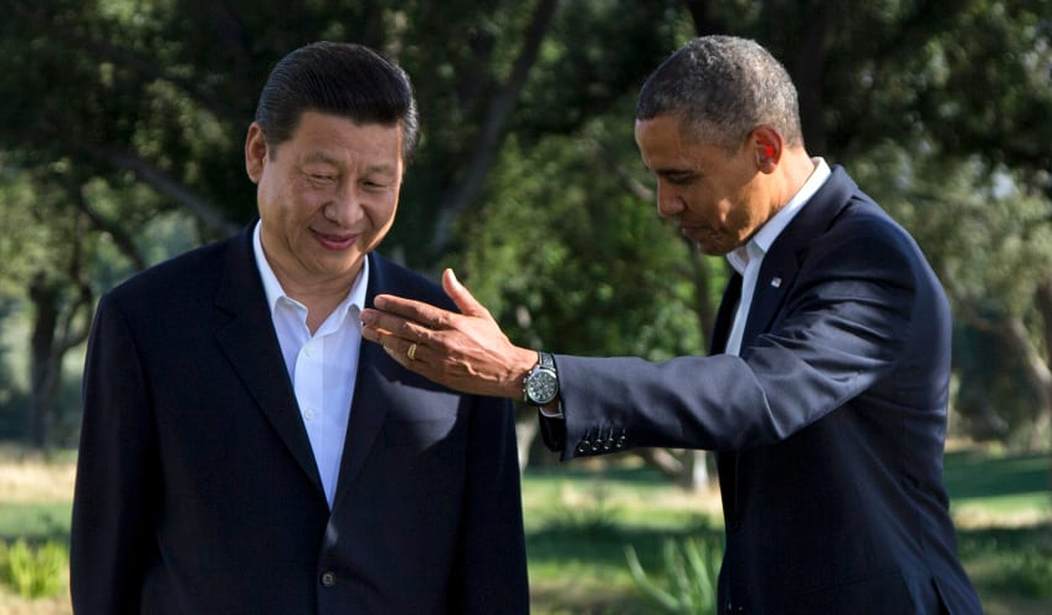WASHINGTON — As hundreds of thousands of Hong Kong residents keep their protest posts in the streets, yearning for demands of democracy and free speech that China has no intention of meeting, President Obama met with a Chinese envoy Wednesday about the “future potential” of bilateral relations.
National Security Adviser Susan Rice traveled to Beijing in early September to lay the groundwork for Obama’s visit there Nov. 10-12.
Wednesday, she sat down with Foreign Minister Wang Yi at the White House. “Ambassador Rice underscored the U.S. interest in closer coordination and cooperation between the U.S. and China on regional and global issues, including Afghanistan, global health security, the Middle East, and the risks posed by North Korea’s nuclear program,” the White House said in a readout of the meeting.
In mapping out their preparations for Obama’s visit, Rice “emphasized that this visit is an opportunity for in-depth discussions about the future potential of the U.S.-China relationship.”
The White House said Obama “joined the meeting to underscore his commitment to building a stable and constructive U.S.-China relationship, including by strengthening cooperation on shared challenges, such as climate change, the Ebola epidemic, and countering the threat posed by terrorists, particularly ISIL.”
The president also “affirmed that he is looking forward to his visit to China.”
“The President and Ambassador Rice also noted that the United States is following developments in Hong Kong closely and expressed their hope that differences between Hong Kong authorities and protesters will be addressed peacefully,” the readout continued. “The United States has consistently supported the open system that is essential to Hong Kong’s stability and prosperity, universal suffrage, and the aspirations of the Hong Kong people.”
At Tuesday’s press briefing, Foreign Ministry spokeswoman Hua Chunying reiterated the PRC’s message to other countries to back off.
“We urge relevant countries to be prudent in words and deeds, refrain from interfering in Hong Kong’s internal affairs in any way, and do not support the illegal activities such as the ‘Occupy Central’ nor send any wrong signal,” Hua warned.
Appearing with Secretary of State John Kerry in Washington Wednesday, Foreign Minister Wang said “China and the United States need to work together to build a new model of major country relations featuring non-conflict, non-confrontation, mutual respect, and win-win cooperation.”
Obama announced three years ago a “pivot” in U.S. focus toward the Asia-Pacific, raising criticism that by making the region a “top priority” of foreign policy he was taking an eye off the Middle East.
Wang compared the U.S.-China relationship to “a giant ship sailing on the sea.”
“It requires that both sides work jointly to keep the ship on the right course, keep injecting the impetus for it to forge ahead; and at the same time, we also work jointly to properly handle hidden rocks and shoals. I believe we need to enhance mutual trust, strategic trust; reduce mutual strategic misgivings; and reduce our misjudgment,” he said. “As long as we work jointly in that direction, we will be able to meet our goal.”
“This is our common mission. It is also the responsibility that we need to jointly fulfill for the international community.”
On Hong Kong, Kerry stressed “we believe open society with the highest possible degree of autonomy and governed by rule of law is essential for Hong Kong’s stability and prosperity.”
“And we have high hopes that the Hong Kong authorities will exercise restraint and respect for the protesters’ right to express their views peacefully,” Kerry added.
The White House has been careful with its language about the protesters’ demands, with White House press secretary Josh Earnest this week saying the “basic legitimacy of the chief executive in Hong Kong will be greatly enhanced” if candidates aren’t vetted by China. State Department spokeswoman Jen Psaki repeated the same mantra at Tuesday’s briefing about the legitimacy of the leader being “greatly enhanced” by free and fair elections.
To be included on the ballot, China will ascertain that candidates meet its criteria, including “love the country and love Hong Kong.” The approval of candidates by China before they even make it to the ballot is a change in Hong Kong’s Basic Law.
Free speech grievances of the protesters go beyond just voting; one of the protest leaders, 17-year-old Joshua Wong, campaigned at age 15 against state efforts to pump Chinese government “patriotic education” classes into his school.
Wang reacted firmly to Kerry’s handful of words on Hong Kong, stressing that “the Chinese government has very firmly and clearly stated its position.”
“Hong Kong affairs are China’s internal affairs. All countries should respect China’s sovereignty. And this is also a basic principle governing international relations. I believe for any country, for any society, no one will allow those illegal acts that violate public order,” Wang said.
“That’s the situation in the United States, and that’s the same situation in Hong Kong. We believe that the Hong Kong Special Administrative Region’s government has the capability to properly handle the current situation in accordance with the law.”
Kerry issued a congratulatory message to China on its National Day Wednesday, marking the founding of communist China.
“These past 35 years have seen our cooperation expand in remarkable ways,” Kerry said. “Our continued efforts to confront some of the world’s most pressing challenges such as climate change, the deadly Ebola virus, wildlife trafficking, and nuclear nonproliferation demonstrate that comprehensive cooperation between our countries is indispensable.”
Wang also met with Defense Secretary Chuck Hagel Wednesday. The Pentagon said the two “reaffirmed both side’s interest in strengthening cooperation on regional and global challenges, including the threat posed by the Islamic State in Iraq and the Levant (ISIL), and the international response to the Ebola epidemic in West Africa.”
If President Obama handles China with kid gloves he could find himself at odds with influential lawmakers in his party — especially if the crackdown goes beyond tear gas and pepper spray.
House Minority Leader Nancy Pelosi (D-Calif.), who has been critical of China’s human rights record “since even before Tiananmen Square,” in her words, told reporters at a press conference on Wednesday that “people throughout the world should speak up on what is happening in Hong Kong.”
“It’s amazing to see how young — some of them in secondary school, some high school students,” Pelosi said. “They have their demonstration. They don’t run from tear gas. They clean up behind themselves, and they show up the next day because they want to have what was promised to Hong Kong.”
Famous Chinese dissident Ai Weiwei last year accused Pelosi of going soft on China, though. “She used to be a human-rights defender,” the artist told Playboy magazine. “Now she talks about how beautiful China is.”
Senate Foreign Relations Committee Chairman Robert Menendez (D-N.J.) directly addressed Hong Kong’s Chief Executive Leung Chun-ying in a letter Wednesday, asking the official who has sided with Beijing to give the protesters “the full democratic rights and freedoms that they have been promised and which they deserve.”
Menendez expressed “grave concerns” over the use of tear gas and pepper spray on peaceful demonstrators and urged “you and your government to fully respect the rights of the people of Hong Kong to peaceful assembly and freedom of expression, which are enshrined in the Hong Kong Bill of Rights.”
Menendez called it a “perversion” to suggest that choosing from China-approved candidates “is the realization of aspirations of the people of Hong Kong for autonomous self-government, democratic governance, and genuine ‘universal suffrage’ in Hong Kong.”
“For nearly two decades, Hong Kong has thrived as a free society under ‘one country, two systems.’ This freedom is now eroding as Beijing appears to undermine its promise to allow genuine democratic elections in Hong Kong. A managed choice is no choice at all,” Royce said in a statement Wednesday evening.
“Now is the time for genuine dialogue and to maintain the promises of the Basic Law between the government of Hong Kong, the people of Hong Kong, and the People’s Republic of China.”
The protesters, many not alive at the time of the crackdown in Tiananmen Square 25 years ago, have often cited the determination of the student protesters back then in their vow to stay in the streets of Hong Kong until their demands are met.
In May, leaders of the Tiananmen protests testified before a House subcommittee about “missed opportunities” to affect change in the China over the years before the PRC grew into the superpower faced today.
“If China remains a dictatorship it could be even more bloody than the 20th century,” warned Zhou Fengsuo, co-founder of the rights group Humanitarian China and No. 5 on the Chinese government’s most-wanted list after Tiananmen.









Join the conversation as a VIP Member